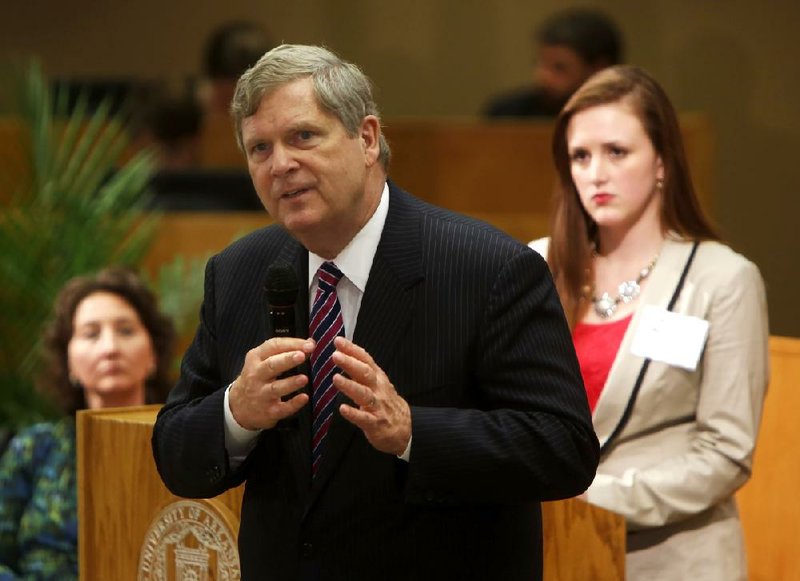Correction: Tom Vilsack is U.S Secretary of Agriculture. His first name was omitted in this article.
FAYETTEVILLE — U.S. Secretary of Agriculture Vilsack paid homage Tuesday to Arkansas’ farming and livestock industry, noting that he was motivated by former Arkansas U.S. Sen. Dale Bumpers, Arkansas’ Bill Clinton and others as his career in agricultural policy developed.
The former Iowa governor spoke at the University of Arkansas at Fayetteville campus as the featured speaker at the second annual Dale and Betty Bumpers Distinguished Lecture Series.
“We in America do not honor agriculture and rural areas as much as we should,” he said. “We’re a strong, secure nation in part because of agriculture. We don’t have to depend on a single foreign country to feed ourselves.”
Vilsack noted that 40 percent of U.S. military personnel come from rural areas, even though those areas make up only 16 percent of the population.
Among the short-term challenges agriculture faces, he said, is a shortage of U.S. workers.
“We’re reliant on immigrant labor,” he said, adding that “we’ve got to have immigration reform.” That overhaul should include a pathway to citizenship and a guest-worker program, he said.
A medium-term challenge is the out-migration of young people from rural areas, Vilsack said.
“We have an aging rural population. We need to make the case to young people of the opportunity in agriculture,” Vilsack said. Microloans are among the tools that should be used to encourage young farmers, he said.
On the global level, he said, free-trade agreements with other nations mean “unlimited opportunity” for U.S. farmers.
Vilsack warned that global warming is a long-term threat that will affect some crops in the future, and that the industry must develop tools to deal with pests that are a growing result of that warming.
Lawrence McCullough,state director of the U.S. Department of Agriculture rural development office, had high praise for Vilsack after the presentation.
“He’s an excellent orator. He’s entirely grounded,” Mc-Cullough said. “He knows this topic extremely well.”
Vilsack said he is aware of a planned large-scale hog farming operation that is being developed in the watershed of the Buffalo National River and has seen the environmental assessment for the property.
“We’ve reviewed it, counsel has reviewed it, we believe it’s sound,” he said. “There are steps that can be taken. There is some distance from the river.”
Business, Pages 23 on 04/24/2013

